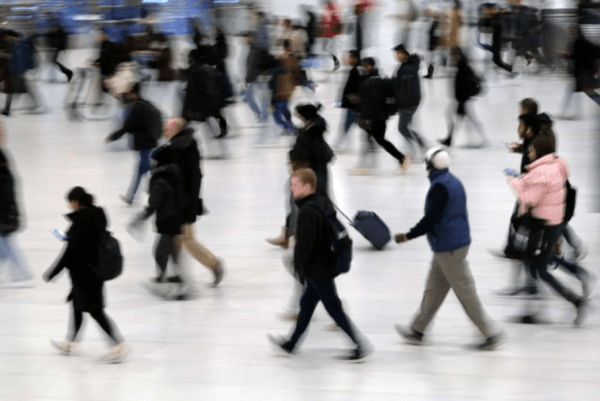Eight billion and the count-up to disaster
February 17, 2023 · By UCANEWS for www.ucanews.com

Commuters arrive at the Oculus station and mall in Manhattan on Nov. 17, 2022, in New York City. According to a report by the United Nations population division, the world’s population has reached 8 billion people. (Photo: AFP)
Eight billion and the count-up to disaster
The world’s population exceeds eight billion people, more than the planet can easily bear. The environment, other species, and all of us face a bleak future that calls us to a deeper trust in God’s love that used Jesus’ embrace of the way of the cross to bring about an unexpected hope for the world.
In January 2011, the cover story in National Geographic magazine was titled “Population 7 billion: How your world will change.” The report was in response to a projection that toward the end of that year the world population would reach seven billion.
Somewhere on Nov. 15 of last year, a child was born who is the eight billionth human inhabitant of planet Earth. God alone can know who that particular child is, but the whole world can know the significance of that birth.
Eight billion is a lot of people. In fact, it is practically impossible for any of us to even count that high, let alone grasp the magnitude of the number. We could probably not finish counting to 8,000,000,000 before the end of the century if we were to start counting today and went without resting, eating, or doing anything else for all that time.
I pray that the child can have a happy life that brings joy to many people and knowingly or not becomes a clear reminder of God’s love.
And yet I also wonder if the world’s population reaching such a high number and projected to reach a peak of 10.4 billion in only a few decades is unmitigated good news.
If that child born on Nov. 15 survives infancy and childhood, in what sort of world will she or he grow up and live?
“We are probably already well into a period of universal crisis unmatched in human history”
It will almost certainly not be a pleasant one. We are probably already well into a period of universal crisis unmatched in human history except, perhaps, by the bubonic plagues of the sixth and fourteenth centuries and the Second World War of the twentieth.
The lifetime of that child will be marked by various crises that are made worse by our huge population. In fact, some of those crises are undoubtedly caused by our unprecedentedly enormous presence on the planet.
Our impact is so drastic that earth scientists speak of a new geologic epoch they dub the “Anthropocene.” That epochal name comes from the Greek “anthropos,” meaning “human.” It is superseding the Holocene that began some 11,650 years ago when the latest ice age ended and humans began to spread and develop agriculture, technology and civilizations.
The end of an epoch is generally marked by mass extinctions, and our Holocene is no exception. The sixth mass extinction, the one we are witnessing when we choose to or are forced to look, is called the beginning of the Anthropocene because besides witnessing it we are causing it.
Scientists estimate that the current rate of species extinction may be as much as one thousand times the normal rate at which life forms naturally disappear.
Those extinctions are brought about by habitat destruction when population pressure causes people to take over other species’ homes. Pollution of air and water are further causes. Over them all is climate change brought about by burning the fossils of earlier flora and fauna, now oil, gas and coal.
“As societies seek, hoard, or protect scarce resources militarism and the risk of confrontation increase”
As the population increases, more habitats must be taken over and modified to provide space for people. That means less space for others of God’s beloved creatures.
Increased population means increased demands for power, leading to increased pollution of air and water. That pollution, aptly dubbed “populution,” speeds climate change that threatens agriculture and raises seawater levels that force further limits on space available for human habitation and food production.
Climate- and scarcity-driven refugees increase social disruption as they move from place to place to flee disaster. As societies seek, hoard, or protect scarce resources militarism and the risk of confrontation increase.
None of this is news to people who have paid attention to what is happening around the world.
Neither is it news what must be done, or what should have been done before we reached this point: decreased consumption by the wealthy, political and social justice, clean energy, education and empowerment of girls and women (the most effective means of controlling population growth), equitable access to food, health care, and resources.
Is any of that going to happen in time and on the necessary scale? No. It is too late to fix the world in which that newborn eight-billionth child will live. Even if all those “fixes” were unexpectedly to happen, it would only ease, not end, populution.
What does that mean for followers of Christ?
Perhaps we should look to Jesus in the Garden of Gethsemane. He knew that his prospects were not good in any worldly sense. In fact, they were dismal. But though he wished it were otherwise he continued to do the will of the Father, confident that faithfulness in the face of futility would ultimately be worked into the building of the Kingdom.
If we can develop that same confidence in the face of our inevitable planet-wide disaster, we may find a hope that can transcend the here and now and enable us to trust that the damage we inflict on God’s world will not damage God’s life-giving love for us.
*The views expressed in this article are those of the author and do not necessarily reflect the official editorial position of UCA News.






